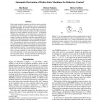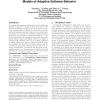10 search results - page 1 / 2 » Online and onboard evolution of robotic behavior using finit... |
ATAL
2009
Springer
13 years 11 months ago
2009
Springer
AAAI
2010
13 years 6 months ago
2010
Finite-state controllers represent an effective action selection mechanisms widely used in domains such as video-games and mobile robotics. In contrast to the policies obtained fr...
GECCO
2003
Springer
13 years 10 months ago
2003
Springer
We describe the first instance of an approach for control programming of humanoid robots, based on evolution as the main adaptation mechanism. In an attempt to overcome some of th...
GECCO
2008
Springer
13 years 6 months ago
2008
Springer
Increasingly, high-assurance applications rely on autonomic systems to respond to changes in their environment. The inherent uncertainty present in the environment of autonomic sy...
ROMAN
2007
IEEE
13 years 11 months ago
2007
IEEE
–This paper presents a novel affect-sensitive human-robot interaction framework for rehabilitation of children with autism spectrum disorder (ASD) where the robot can detect the ...



